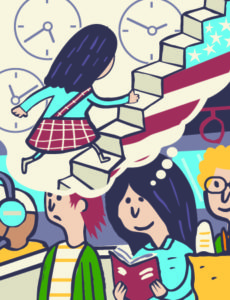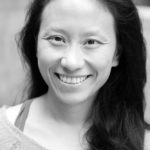A previous version of this post was published on September 17, 2016, in The Drunken Odyssey‘s podcast 224 at thedrunkenodyssey.libsyn.com.
In 2015, working in the legal field during a recession was like being forced through a paper shredder, slowly. In the midst of economic instability and career uncertainty, I found solace in the written word. I enjoyed the subway ride to work, where I could read, more than the work itself. When I read, I dreamt, and while the downtown high rises unfolded before me, I felt that all things were possible.

“I was able to relate to the characters’ fight against oppression and quest for self-determination.” (Illustration by Josh Quick)
A fan of fantasy and historical fiction, I became fascinated by the Outlander Series by Diana Gabaldon. The series tells the adventures of Claire Randall, a British Army nurse serving in WWII, who accidentally travels back in time to 18th-century Scotland. The series follows her adventures as she attempts to prevent The Rising, an armed Scottish insurrection against the English that was ultimately defeated, and resulted in economic and social disaster for the Highland Scots. Later in the series, Claire and her gang immigrate to the early American Colonies and fight for the Americans in the War for Independence.
Outlander’s enduring popularity is due in part to its ability to cross multiple genres. It is a deeply romantic series, but unlike the usual bodice-ripping supermarket paperbacks, the story is very feminist. Claire saves others through her compassion, ingenuity, knowledge of the future, and medical skills. The author’s attention to historical detail is reflected in her use of vivid descriptions. The characters, plot, and conflict are strong enough to defy genre, and I was able to relate to the characters’ fight against oppression and quest for self-determination. My parents immigrated to California shortly after the Tiananmen Square Massacre in 1989. In the quest for economic opportunities and social advancement, they’ve sacrificed closeness to extended family, friends, their native homeland, and moreover, any easy sense of belonging. As a first-generation immigrant family, we lived in very impoverished and gang-ridden areas. The older I became, the more I realized that racial and gender barriers affected one’s social advancement in the US. To some, I’ll always be a foreigner. In college, I majored in Asian American Studies and became politically active. After law school, I worked for a local legal aid, representing low-income defendants and seniors.
After finishing the first Outlander novel, I continued to read voraciously and widely. I came to realize that these authors were people, not magicians. They honed their craft over the course of their careers. They had talent but more importantly, the courage and perseverance to write. The best ones did not necessarily walk traditional paths to being popular writers: e.g., earning English BAs and MFAs, working as editors, etc. Much like their characters, these writers followed their hearts and were able to transform the lives around them. Inspired, I tried to forge a new path.
The Outlander series has taught me that realistic portrayals of people’s struggles with political, societal, and personal forms of oppression can be entertaining and marketable. US culture identifies with the underdog and wants the underdog to win. Although I do not set out to make political points in my fiction, many of my stories are rooted in my experiences growing up Chinese American, often in environments where I was the only minority, or the only female attorney.
In March 2016, Amazon’s Day One literary magazine published my short story Mr. Kim. It features an Asian American male protagonist, who struggles with his identity and sense of place, with a supernatural twist. “Mr. Kim” is the first piece I’ve written that I consider easily accessible to a larger audience, as it is sold online through an international retailer. My latest short story, Think, Baby Turtle, is a confluence of my favorite motifs: the immigrant struggle, the pressures of poverty, and how a character’s quest for self-realization transforms those around her.
The voices and experiences of women and people of color are not well-represented in the literary canon. As a child in the ‘90s, my school curriculum did not include works by Maxine Hong Kingston or Toni Morrison. As I grew older, I sought out works written by those who lived at the social or economic margins. I Love Yous Are for White People by Lac Su impressed me with its casual writing style and psychological depth. The novel was like a mirror. Although I respected and enjoyed the text of those in the canon, I resented its lack of diversity, and wondered how much more I could have grown as an author if I were introduced to diverse works earlier.
I write what I think and feel and not to prove a point or for any particular cause. I write from a perspective that is not well-represented in either academia or general literature, and about subjects that attempt to cross genre lines. However, I avoid a tone and style that would merely mimic my favorite authors. I’d like to end with a quote from Outlander:
“In that moment when time stops, it is as though you know you could undertake any venture, complete it and come back to yourself, to find the world unchanged, and everything just as you left it a moment before. And it’s as though knowing that everything is possible, suddenly nothing is necessary.”
For me, reading Diana Gabaldon created that moment. Wherever this path leads, I’ll always be indebted to those authors whose tenacious and unique works expanded my universe.
Note: The opinions expressed by guest bloggers at the Submittable blog are theirs alone and do not necessarily reflect the opinions of Submittable.
 Mingzhao Xu immigrated to the United States from China as a child. One of her greatest joys in life is using fiction to highlight the humor, challenges, and pathos of her childhood. She currently lives in California. A publication list can be provided upon request.
Mingzhao Xu immigrated to the United States from China as a child. One of her greatest joys in life is using fiction to highlight the humor, challenges, and pathos of her childhood. She currently lives in California. A publication list can be provided upon request.
